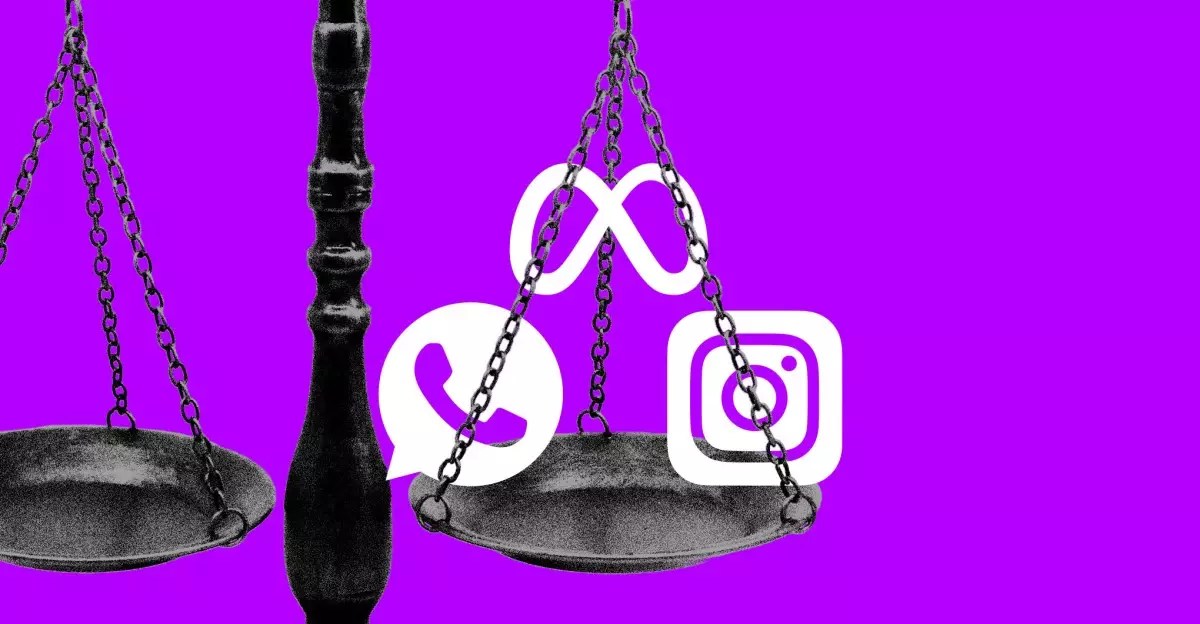In a high-stakes courtroom drama that could reshape the contours of the tech industry, Mark Zuckerberg took the stand in a trial that digs into the core of Meta’s power and expansions. The saga revolves around the Federal Trade Commission’s (FTC) antitrust lawsuit that seeks to dissect and potentially dismantle Zuckerberg’s multi-billion-dollar acquisitions of Instagram and WhatsApp. The stakes are monumental—not just for Meta but for the entire landscape of digital communication. As Zuckerberg faced questions aimed at characterizing him as a monopolist intent on snuffing out competition, he portrayed a different narrative: one of strategic foresight and innovative expansion.
The hallmark of this dramatic interplay is Zuckerberg’s traumatic dance with the notion of competitive markets. Was he merely an opportunist stifling nascent rivals, or a visionary seizing the moment to bolster a strategic portfolio for a shifting landscape? This trial isn’t merely an examination of past actions; it is a literary recounting of the unwritten narrative of the tech evolution, of how giants can emerge from humble origins, yet still face scrutiny for their dominance.
Strategic Investments or Competitive Suppression?
As Zuckerberg testified over three grueling days, a striking dichotomy emerged between the FTC’s assertions and Zuckerberg’s defense. At the heart of the FTC’s argument is the belief that the purchase of WhatsApp for $19 billion was not about growth but about suppression. With an air of conviction, Zuckerberg countered, presenting a case that his motivation was underpinned by a sincere desire to evolve communication in a manner consistent with the trends he observed, namely a migration from public forums to private messaging.
Amid this tug-of-war, one cannot ignore the dual role Meta plays as both a facilitator of communication and a corporate colossus wielding considerable influence. Zuckerberg’s acknowledgment that he thought WhatsApp would not immediately pose a competitive threat to Facebook raises questions. If he anticipated WhatsApp’s potential success, why was a $19 billion investment justified? Could it be that he saw value not just in WhatsApp’s current state but in the control it would afford him in an industry characterized by fierce competition?
In his testimony, Zuckerberg painted WhatsApp and Instagram as platforms that transcended mere transactional acquisitions. He reflected on his early impressions of WhatsApp co-founders Jan Koum and Brian Acton, describing their initial disdain for social media. This paints a rather intriguing picture: while Zuckerberg envisioned a platform that would adapt and grow, its founders had a vision quite contrary to that.
The Rise of the Platforms
Skeptics have often viewed Meta’s acquisitions through a lens clouded by monopolistic intent, but Zuckerberg offered a narrative of transformation. Under his leadership, both Instagram and WhatsApp have transformed into juggernauts of global communication, with WhatsApp alone boasting nearly 3 billion users—an astonishing feat that surpasses earlier forecasts made even by Zuckerberg himself.
Zuckerberg’s fascination with these platforms transcends the simplistic view of competition; it reveals a deeper understanding of the evolution of digital interaction. He argues that the rise of WhatsApp marked a pivot towards private communication amidst a digital landscape heavily dominated by public expressions. This pivot didn’t merely enhance Meta’s portfolio; rather, it represented an attempt to stay ahead of shifting consumer behaviors that had become evident over the last decade.
Moreover, Zuckerberg’s testimony reveals a blend of optimism and pragmatism—acknowledging that while Meta relies on external platforms like Apple and Google for distribution, it sought to create leverage through strategic acquisition. This acknowledgement had a dual effect: it highlighted potential vulnerabilities in Meta’s business model while simultaneously hinting at a proactive approach to fortifying the brand against external pressures.
Legacy of Investment vs. Accusation
When examining Zuckerberg’s defense, it may be easy to see him as a man merely justifying past decisions. However, the underlying sentiments revealed through his statements illustrate a grappling with the impact of those decisions. Despite the FTC’s characterization of Instagram and WhatsApp as victims of a “catch-and-kill” strategy, the testimony more closely echoes that of transformational investments. Each platform has evolved, often exceeding expectations, and has contributed significantly to Meta’s revenue streams—including a staggering $10 billion generated annually from business advertisements across its platforms.
Even Sheryl Sandberg, former COO of Meta, admitted to underestimating the value of Instagram in an internal email—a reflection that casts shadows upon the notion of calculated suppression. This admission reinforces the argument that sometimes, within corporate strategy, foresight can be driven more by instinct than by a meticulous plan for dominance.
Zuckerberg’s time in the witness stand was not merely a defense; it outlined a broader narrative of adaptability, innovation, and a willingness to embrace the complexities of an ever-evolving digital landscape. Whether this will satiate the FTC’s ambitions or contribute to a redefined understanding of monopoly in the tech sector remains to be seen. What is evident is that the battle over Meta’s legacy is very much a reflection of our collective relationship with technology, competition, and the narratives that shape it.


Leave a Reply